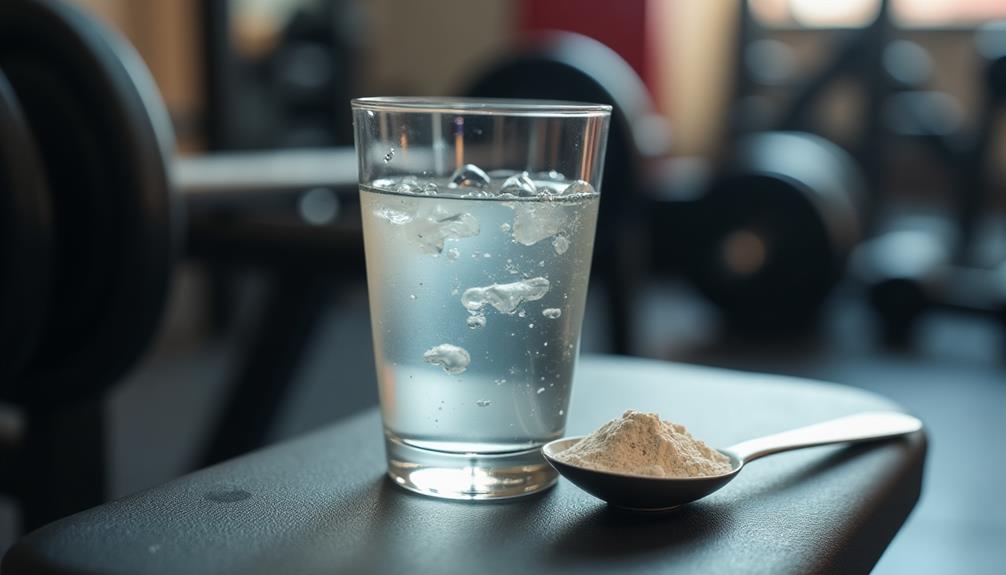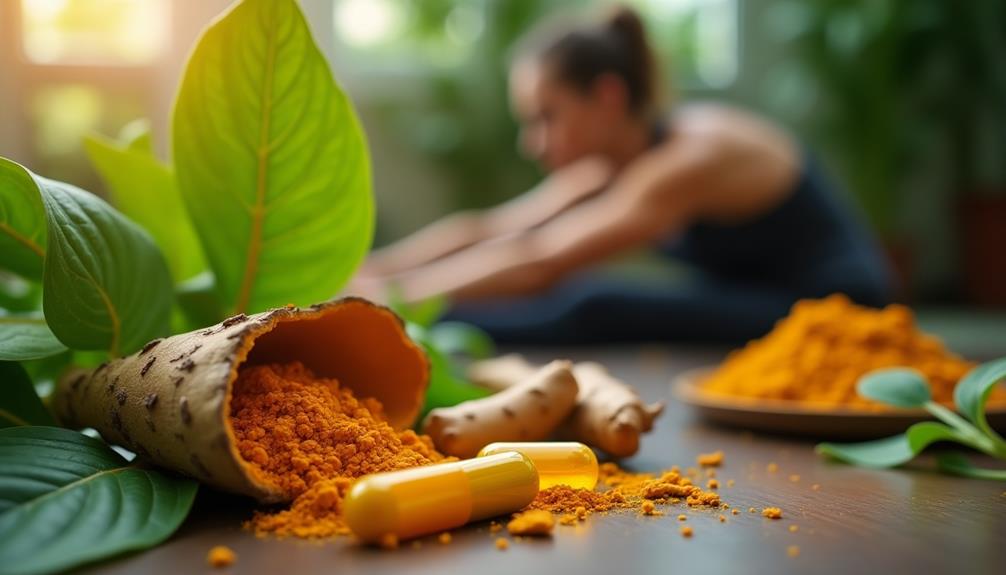To recover from muscle strain, consider five essential supplements. First, Omega-3 fatty acids, found in fish oil, help reduce inflammation and enhance muscle health. Next, protein supplements, like whey and casein, aid in repairing tissue and improving strength. Don't overlook creatine monohydrate, which boosts muscle repair and reduces damage. Curcumin, derived from turmeric, offers anti-inflammatory benefits and supports circulation. Finally, glutamine can help reduce soreness and boost hydration. These supplements work synergistically to promote recovery, ensuring you're back to your routine faster. Stick around to discover how to optimize their use for best results!
Core Insights
- Omega-3 Fatty Acids: Reduce inflammation and promote better blood flow, aiding in muscle recovery and tissue repair.
- Protein Supplements: Essential for repairing muscle tissue; consider whey protein post-workout and casein for a steady amino acid release.
- Creatine Monohydrate: Boosts ATP production and enhances muscle repair while reducing damage and improving hydration.
- Curcumin: Reduces oxidative stress and inflammation, supports tissue repair, and is best absorbed when paired with black pepper.
- Glutamine: Supports muscle repair, reduces soreness, and boosts the immune system; consult a healthcare professional before use.
Omega-3 Fatty Acids

When it comes to recovering from muscle strains, incorporating omega-3 fatty acids into your routine can make a significant difference. These essential fats, found in sources like fish oil and flaxseed, help reduce inflammation, which can speed up your recovery process. By decreasing swelling in the affected area, omega-3s promote better blood flow, delivering nutrients vital for healing. Top healthy fats for muscle gain can also contribute to overall muscle health and recovery. Optimizing your fat intake with the right sources can enhance your body's ability to repair and rebuild muscle tissue.
You can easily add omega-3s to your diet through supplements or by eating fatty fish like salmon and mackerel. Aim for at least two servings of fish per week, or consider a high-quality fish oil supplement. As you integrate omega-3 fatty acids into your regimen, you'll likely notice an improvement in your recovery time and overall muscle health.
Protein Supplements

For peak recovery from muscle strains, incorporating protein supplements into your routine can be very beneficial. Protein plays an optimal role in repairing muscle tissue and promoting recovery. When you experience a strain, your muscles need extra protein to heal. Additionally, pairing protein supplements with Vitamin D3 intake can enhance muscle recovery and strength, as Vitamin D3 supports overall muscle health.
Whey protein is a popular choice due to its high bioavailability and quick absorption. It's excellent for post-workout recovery. Casein protein, on the other hand, digests slowly, providing a steady release of amino acids, which can be useful overnight.
Choose a protein supplement that fits your dietary needs and preferences. Mix it into smoothies, or shakes, or even your meals. Remember to balance your protein intake throughout the day for best results. This way, you'll support your recovery effectively.
Creatine Monohydrate

Creatine monohydrate stands out as a powerful supplement for enhancing muscle recovery after strains. It helps replenish your energy stores and supports muscle repair. For ideal results, consider using micronized creatine powder for better absorption and mixability. Incorporating creatine into your recovery routine can provide several benefits, including:
- Increased ATP Production: It boosts adenosine triphosphate (ATP) levels, providing the energy your muscles need for recovery.
- Enhanced Muscle Repair: Creatine promotes protein synthesis, aiding in muscle recovery and growth.
- Reduced Muscle Damage: It helps decrease markers of muscle damage, which can alleviate soreness.
- Improved Hydration: Creatine draws water into your muscle cells, enhancing overall hydration and function.
Curcumin

Although many people associate curcumin primarily with its anti-inflammatory properties, it also plays a significant role in muscle strain recovery. This compound, derived from turmeric, helps reduce oxidative stress and inflammation in your muscles. When you experience strain, curcumin can aid in the healing process by promoting blood circulation and supporting tissue repair.
You might consider incorporating curcumin into your routine, especially if you're recovering from an injury. It's often available in supplement form or as a spice in your meals. To maximize its benefits, pair it with black pepper, which enhances absorption. Remember, always consult a healthcare professional before starting any new supplement to confirm it's right for you.
Glutamine

Glutamine, an amino acid present in your body, plays an important role in muscle strain recovery. It's necessary for maintaining muscle mass and supporting immune function, especially after intense workouts. To harness its advantages, consider the following:
- Supports Muscle Repair: Glutamine aids in repairing muscle fibers damaged during strain.
- Reduces Muscle Soreness: It can help lessen soreness, allowing you to recover more quickly.
- Boosts Immune System: A strong immune system is essential for overall recovery, and glutamine plays a key role here.
- Enhances Hydration: It helps maintain cellular hydration, promoting optimal muscle function.
Including glutamine in your recovery plan can greatly improve your results. Always consult a healthcare professional before starting any supplementation.
Frequently Asked Questions
How Do These Supplements Specifically Aid Muscle Strain Recovery?
When you're sidelined by muscle strain, you'll find specific supplements can boost your recovery. They reduce inflammation, enhance muscle repair, and help you regain strength faster, getting you back to your routine sooner.
Are There Any Side Effects Associated With These Supplements?
Yes, there can be side effects like digestive issues, headaches, or allergic reactions. It's important you monitor your body's response and consult a healthcare professional if you notice anything unusual after taking them.
Can I Get These Nutrients From Food Instead?
Yes, you can definitely get these nutrients from food! A balanced diet rich in fruits, vegetables, whole grains, and lean proteins usually provides the essential nutrients your body needs for recovery. Just focus on variety!
How Long Does It Take to See Results From These Supplements?
You'll typically notice results from supplements within a few weeks, but it varies based on your body and diet. Consistency in taking them alongside a balanced diet will enhance your progress and recovery time.
Should I Consult a Doctor Before Taking These Supplements?
Shouldn't you prioritize your health? It's wise to consult a doctor before starting any supplement regimen. They can help you understand potential interactions and guarantee you're making the best choices for your body's needs.

